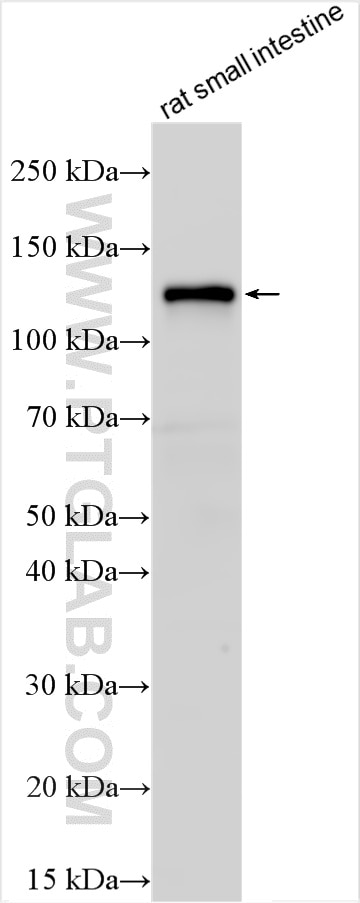Tested Applications
| Positive WB detected in | rat small intestine tissue |
Recommended dilution
| Application | Dilution |
|---|---|
| Western Blot (WB) | WB : 1:500-1:2000 |
| It is recommended that this reagent should be titrated in each testing system to obtain optimal results. | |
| Sample-dependent, Check data in validation data gallery. | |
Product Information
28303-1-AP targets ENPP3/CD203c in WB, ELISA applications and shows reactivity with human, rat samples.
| Tested Reactivity | human, rat |
| Host / Isotype | Rabbit / IgG |
| Class | Polyclonal |
| Type | Antibody |
| Immunogen | ENPP3/CD203c fusion protein Ag28478 Predict reactive species |
| Full Name | ectonucleotide pyrophosphatase/phosphodiesterase 3 |
| Calculated Molecular Weight | 875 aa, 100 kDa |
| Observed Molecular Weight | 120-150 kDa |
| GenBank Accession Number | BC146579 |
| Gene Symbol | ENPP3 |
| Gene ID (NCBI) | 5169 |
| Conjugate | Unconjugated |
| Form | Liquid |
| Purification Method | Antigen affinity purification |
| UNIPROT ID | O14638 |
| Storage Buffer | PBS with 0.02% sodium azide and 50% glycerol, pH 7.3. |
| Storage Conditions | Store at -20°C. Stable for one year after shipment. Aliquoting is unnecessary for -20oC storage. 20ul sizes contain 0.1% BSA. |
Background Information
ENPP3/CD203c is part of ectonucleotide pyrophosphatases/phosphodiesterase (ENPP) family and plays a role in various physiological processes. Increased levels of ENPP3 have been observed in conditions, such as clear cell renal cell carcinoma, bile duct carcinoma, and colorectal cancer, positioning ENPP3 as a potential tumor marker (PMID: 38749434). Mice harboring a point mutant of ENPP3 that specifically abolishes its cGAMP hydrolase activity are more resistant to both primary tumor growth and metastasis in certain cancers (PMID: 38149831). High molecular weight band is the glycosylated form of ENPP3 (PMID: 27665743, 30271993)
Protocols
| Product Specific Protocols | |
|---|---|
| WB protocol for ENPP3/CD203c antibody 28303-1-AP | Download protocol |
| Standard Protocols | |
|---|---|
| Click here to view our Standard Protocols |



